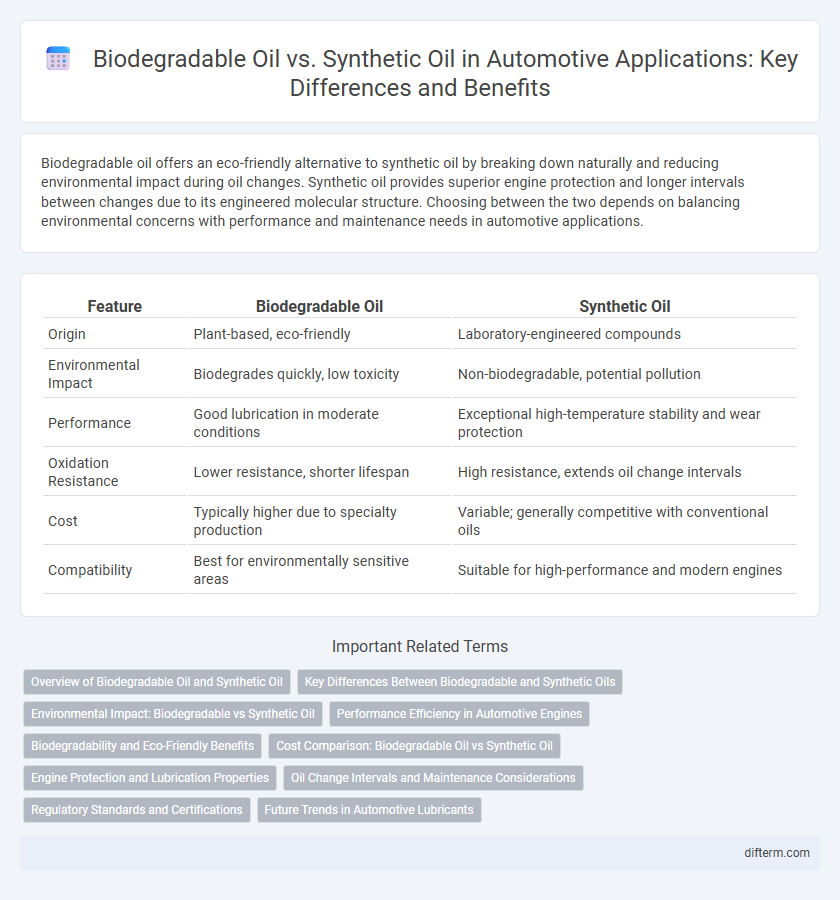Biodegradable oil offers an eco-friendly alternative to synthetic oil by breaking down naturally and reducing environmental impact during oil changes. Synthetic oil provides superior engine protection and longer intervals between changes due to its engineered molecular structure. Choosing between the two depends on balancing environmental concerns with performance and maintenance needs in automotive applications.
Table of Comparison
| Feature | Biodegradable Oil | Synthetic Oil |
|---|---|---|
| Origin | Plant-based, eco-friendly | Laboratory-engineered compounds |
| Environmental Impact | Biodegrades quickly, low toxicity | Non-biodegradable, potential pollution |
| Performance | Good lubrication in moderate conditions | Exceptional high-temperature stability and wear protection |
| Oxidation Resistance | Lower resistance, shorter lifespan | High resistance, extends oil change intervals |
| Cost | Typically higher due to specialty production | Variable; generally competitive with conventional oils |
| Compatibility | Best for environmentally sensitive areas | Suitable for high-performance and modern engines |
Overview of Biodegradable Oil and Synthetic Oil
Biodegradable oil is derived from renewable biological sources such as vegetable oils, designed to minimize environmental impact through rapid decomposition. Synthetic oil consists of chemically engineered compounds that offer superior performance, heat resistance, and extended engine protection compared to conventional oils. Both oils provide lubrication, but biodegradable oil emphasizes eco-friendliness while synthetic oil prioritizes enhanced durability and efficiency in automotive engines.
Key Differences Between Biodegradable and Synthetic Oils
Biodegradable oil, derived from natural plant-based sources, breaks down quickly in the environment, minimizing ecological impact, whereas synthetic oil is chemically engineered for superior engine performance and extended durability. Biodegradable oils typically have lower toxicity and enhanced biodegradability, making them ideal for environmentally sensitive areas, while synthetic oils offer higher thermal stability and improved lubrication under extreme conditions. The key differences lie in their origin, environmental footprint, and performance characteristics tailored to either sustainability or engine protection.
Environmental Impact: Biodegradable vs Synthetic Oil
Biodegradable oil significantly reduces environmental harm by breaking down naturally in soil and water, minimizing pollution risks from spills and leaks compared to synthetic oil, which is petroleum-based and can persist in ecosystems for decades. Synthetic oil, while offering superior engine protection and longevity, poses greater ecological threats due to its chemical stability and slower degradation rate. Choosing biodegradable oil supports sustainability efforts by lowering toxic waste and promoting ecosystem health in automotive maintenance.
Performance Efficiency in Automotive Engines
Biodegradable oil offers eco-friendly lubrication with moderate performance efficiency, suitable for light-duty automotive engines with lower temperature ranges. Synthetic oil provides superior thermal stability, enhanced viscosity retention, and optimal protection in high-performance engines, resulting in improved fuel economy and extended engine life. Choosing synthetic oil enhances overall engine efficiency by reducing friction and wear under extreme operating conditions.
Biodegradability and Eco-Friendly Benefits
Biodegradable oil offers significant environmental advantages due to its ability to break down naturally without leaving harmful residues, reducing soil and water contamination compared to synthetic oil. Its eco-friendly benefits include lower toxicity and enhanced compatibility with ecosystems, making it a sustainable choice for automotive lubrication. Synthetic oil, although effective in performance, often contains petroleum-based compounds that persist longer in the environment, highlighting the importance of biodegradable alternatives for reducing ecological impact.
Cost Comparison: Biodegradable Oil vs Synthetic Oil
Biodegradable oil typically costs 20-40% more than synthetic oil due to its eco-friendly production processes and renewable raw materials. Synthetic oil offers longer drain intervals and improved engine protection, potentially offsetting its lower upfront price with extended maintenance intervals. Fleet operators and environmentally conscious drivers often evaluate the total cost of ownership, balancing biodegradable oil's premium against synthetic oil's performance benefits and disposal fees.
Engine Protection and Lubrication Properties
Biodegradable oil offers effective engine protection by reducing environmental impact while providing satisfactory lubrication properties suitable for light-duty engines. Synthetic oil delivers superior engine protection through enhanced thermal stability, reduced friction, and better wear resistance, making it ideal for high-performance and heavy-duty vehicles. Both oils contribute to engine longevity, but synthetic formulations typically outperform biodegradable oils in maintaining optimal lubrication under extreme conditions.
Oil Change Intervals and Maintenance Considerations
Biodegradable oil typically requires more frequent oil change intervals, often every 3,000 to 5,000 miles, due to faster degradation and lower thermal stability compared to synthetic oil. Synthetic oil offers extended oil change intervals, commonly ranging from 7,500 to 15,000 miles, enhancing engine protection and reducing maintenance frequency. Maintenance considerations for biodegradable oil include ensuring compatibility with engine seals and monitoring for biodegradation effects, while synthetic oil provides superior resistance to oxidation and sludge buildup, resulting in improved engine performance and longevity.
Regulatory Standards and Certifications
Biodegradable oils in the automotive industry must comply with stringent environmental regulatory standards such as the OECD 301B biodegradability test and meet certifications like the European Ecolabel to ensure eco-friendly disposal and minimal environmental impact. Synthetic oils are governed by performance-oriented standards including API SN/SL and ACEA ACE, focusing on engine protection, oxidation resistance, and thermal stability rather than biodegradability. Compliance with these regulatory frameworks ensures that biodegradable oils reduce ecological damage while synthetic oils maintain mechanical efficiency under extreme operating conditions.
Future Trends in Automotive Lubricants
Biodegradable oils are gaining traction in automotive lubricants due to their environmental benefits and compatibility with strict emission regulations, promoting sustainability in vehicle maintenance. Synthetic oils continue to advance with improved formulations that enhance engine efficiency, reduce wear, and extend oil change intervals, supporting the trend toward smarter, longer-lasting lubricants. Emerging bio-based synthetic blends aim to combine the performance advantages of synthetics with the eco-friendly properties of biodegradable oils, reflecting a significant shift towards greener automotive lubrication technologies.
biodegradable oil vs synthetic oil Infographic

 difterm.com
difterm.com